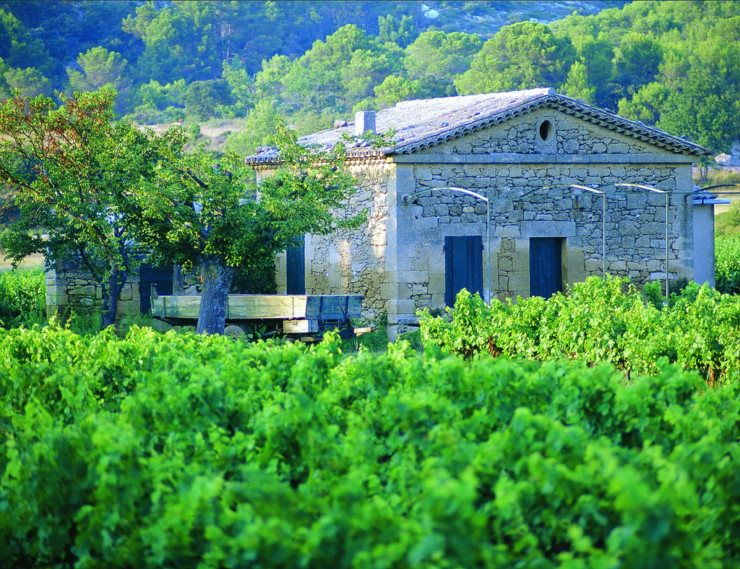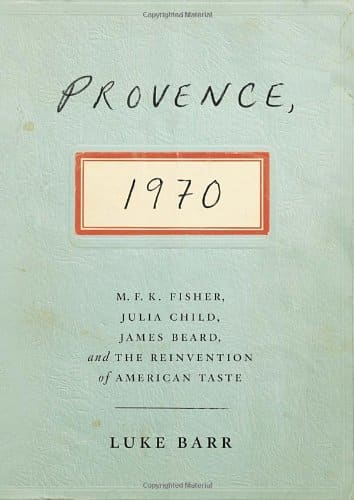Not long ago, I cooked dinner with friends. People do this sort of thing, I’m told, so it shouldn’t be that unusual, I suppose.
Except that these friends were over a thousand miles away.
Thanks to the magic of technology, my friends were in my kitchen by virtue of a computer screen, while I was in theirs. We fixed the same meal, so we could eat at the same table, as it were. I didn’t have the recipe, so every now and then I’d ask what should come next. I got a little teasing for some ingredient substitutions I made, and the size of my carrots, but in the end, we served up plates of a salad and soba noodles with peanut sauce. They had ice cream later, which was homemade. I ate mine from a Talenti jar.
Many great stories of friendship involve images of sharing around a table, breaking bread together, sometimes even cooking together. One such story is Provence, 1970, the story of M.F.K. Fisher, Julia Child, James Beard and three other well-known chefs and the fall and winter they spent in the South of France. Written by Luke Barr, Fisher’s great-nephew, the story is based on journals and letters, and it chronicles the relationship between these friends (and, in ways, rivals) as well as the “democratization of cooking and taste” in America.
In August, the Friendship Project will be exploring the theme of Great Friendship Tales. We invite you to join us for a book club on one such tale, Provence, 1970. This conversation will be available to Tweetspeak patrons only. If you’re not yet a patron, consider joining us in support of the good things this community brings to the world for as little as $1 per month, and be a part of this interesting (and delicious) upcoming conversation.
Reading Schedule:
August 8: Chapters 1-6
August 15: Chapters 7-12
August 22: Chapters 13-17
Buy Provence, 1970
Photo by vinhosdeprovence, Creative Commons license via Flickr. Post by Will Willingham.
- Earth Song Poem Featured on The Slowdown!—Birds in Home Depot - February 7, 2023
- The Rapping in the Attic—Happy Holidays Fun Video! - December 21, 2022
- Video: Earth Song: A Nature Poems Experience—Enchanting! - December 6, 2022


Sandra Heska King says
No offense but (this is point where we always told our son to stop talking right there), I remember some of your kitchen stories. And I’m thinking virtual cooking with friends is probably safest. 😀
This looks fun. Ordering it up now.
Kortney Garrison says
Looking forward to reading along!
Debbie says
Got my copy! Looking forward to reading.
Katie says
Ordered a copy today🙂
Katie says
My copy arrived yesterday.
Have read the prologue and hope to read first chapters this weekend. Intriguing so far:)
Katie says
What an interesting group of people and a very different day and age from now. Luke Barr’s (the author and nephew of M. F. K. Fisher) writing is quite enjoyable.
Will Willingham says
They are an interesting group. 🙂 Hope you’ll join us in the discussion.
Katie says
Hi all:)
Wanted to share some of the sentences and thoughts from the first few chapters:
“WHERE WAS I ?” (M.K. wrote in her small, pale green, spiral bound notebook)
that last paragraph on p. 24 that begins: “Where was she indeed? And why?”
It sounds as if she is digging/searching for her true self. She knows she’s among the elite (“everyone who was anyone”) of the American food world. Yet, she doesn’t really know herself fully. Do any of us?
I can relate to M.K. in her desire to “get away and be on her own. She needed to write, think, and figure out what she wanted.” (middle of p. 25)
After being with family at a reunion, a group of friends, or even at a class – I need down-time to process and revive my energy.
bottom of p. 25 – top of p. 26:
“France had long been at the center of her philosophy. She had made France a touchstone of her writing, in which she alchemized life, love, and food in a literary genre of her own invention. But she was suddenly keenly aware of the need to make a new sense of the old mythologies.”
And: “She was alone in Arles for a reason. It was a reason she was still in the process of formulating.”
I think the author Luke Barr does an excellent job of showing M.K.’s passion for life, food and France. Also, he helps me sense her self-doubt/confusion.
And: (p. 28) “. . .she had embarked on this solo expedition to Arles as a kind of challenge to herself. . .to see Provence as it really was rather than as she imagined it to be. . .” “And more than that: to make sense of her life, and what the future held. . .She could feel the past slipping away. She wasn’t quite sure what she wanted of the future.”
Similarly for me, as we’ve become almost empty-nesters, I’ve thought a lot about “what do I want to do now?” TSP has helped me discover a new passion (or maybe one I had buried) and I have been having a blast the past year and a half or so in exploring poetry.
(p.29) “She was detached. . .there but not there. She was hungry all the time, always in search of a decent, open restaurant, and never quite satisfied. She recorded everything in her notebook.”
This is much the way I felt until finding TSP. Sort of adrift, discontent, discombobulated. It is SO good to have a focus and purpose and fun in my life again:)
(bottom of 29- p. 30) “Again and again, M.F.’s thought returned to the lunches and dinners with the Childs, Beard, and Olney. . .one feast after another, the talk and more talk, comings and goings, . . .”
Like M. F. I have been exposed to, presented with, treated by literary (rather than culinary) feasts on TSP by many of you and EDP and inspired to try my own hand at various types of poems and feel as if I’m finding my voice:)
Laura Brown’s workshop “Place Yourself: With Courage & Imagination” earlier in the summer was truly a boon to my writing and confidence.
I’m SO very thankful for this positive and encouraging community:)
Gratefully,
Katie
Will Willingham says
Katie, great to hear that Tweetspeak has helped out in that “what next” time of life, and that the workshop was fruitful. 🙂
I like that quote you shared also, “She was alone in Arles for a reason. It was a reason she was still in the process of formulating.” This is how it is for us so often, yes? We do a thing that it seems we should do, waiting for the reason to reveal itself.